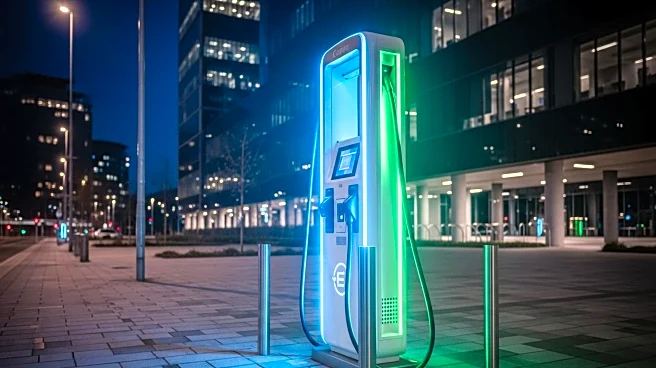What is the story about?
What's Happening?
StarCharge has announced that its Titan Series DC fast charging products have achieved compliance with the Build America, Buy America Act (BABA), following successful CSA certification. This development underscores StarCharge's manufacturing capabilities and its readiness to engage in U.S. federal and state infrastructure projects. The company has invested in a research, development, and manufacturing center in Ohio, which is equipped with capabilities such as complete assembly, metal enclosure and busbar processing, and charging adapter assembly. The Ohio facility currently operates two production lines with an annual capacity of 800 DC fast chargers, with plans to expand to five lines and introduce Battery Energy Storage Systems (BESS) to the U.S. market.
Why It's Important?
The compliance with BABA positions StarCharge as a key player in the modernization of U.S. energy infrastructure, contributing to the country's transition towards a zero-carbon future. The Ohio facility has already created dozens of local jobs, with expectations to grow the workforce to around 100 employees, fostering economic growth and community integration. This expansion not only supports job creation but also enhances local manufacturing capabilities, aligning with national goals for sustainable energy solutions and infrastructure development.
What's Next?
StarCharge plans to continue advancing its product portfolio, with the Aries / Nova 720kW ultra-fast charging platform currently undergoing BABA certification. The company aims to expand its production capacity and introduce new energy storage solutions, working closely with government and industry partners to further modernize U.S. energy infrastructure. These efforts are expected to accelerate the path toward a zero-carbon future, with StarCharge playing a significant role in this transition.
Beyond the Headlines
The achievement of BABA compliance by StarCharge highlights the growing importance of local manufacturing in the U.S. energy sector. It reflects a broader trend towards integrating global resources with local innovation, which could set a precedent for other companies in the industry. This development also raises questions about the future of energy infrastructure in the U.S., particularly in terms of sustainability and technological advancement.















